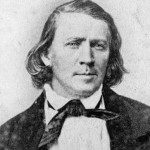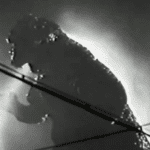
Carla Amott Bentley, and sent to me by Sherry Cole Flack.
Newly posted on the website of the Interpreter Foundation: Preview Video of “Not by Bread Alone: Stories of the Saints in Africa

I found this article unusually interesting: “It’s Not Politics: Fatherhood Decline Causing Rise of Religious Nones”
It reminded me of a column that I originally wrote for the Provo Daily Herald back on 14 April 2000:
A widespread assumption, especially among intellectuals, holds that belief in God derives from irrational, immature needs and wishes, whereas atheism or skepticism results from a grown-up, rational, no-nonsense view of the world as it really is. The most famous statement of this position comes from Sigmund Freud, the founder of psychoanalysis, in his book The Future of an Illusion. According to Freud, religion is an attempt to cope with our cosmic helplessness by imagining a benevolent father figure in the sky. Minnesota governor Jesse Ventura recently declared that religion is for people with weak minds.
New York University psychology professor Paul Vitz disputes such notions in his book Faith of the Fatherless: The Psychology of Atheism. Vitz says that Freud’s theory reveals Freud’s own inadequate knowledge in matters of religion. The pagan faiths of the Mediterranean area, for instance, offered no benevolent father God, and major living religions such as Buddhism and Hinduism lack such a figure. Furthermore, as Vitz observes, “nowhere did Freud publish a psychoanalysis of the belief in God based on clinical evidence provided by a believing patient.” In other words, Freud’s doctrine rests not on scientific data, but on preconceptions and anti-religious prejudices. There is, in fact, growing evidence to suggest that those who lead religious lives tend to be healthier than those who do not, both psychologically and physically.
In fact, Vitz remarks, the idea that a belief might derive from childish needs or powerful unconscious wishes is a sword that can cut two ways. If, for example, one accepts the Freudian theory of the so-called “Oedipus complex,” Vitz writes, one can easily view atheism as “an illusion caused by the Oedipal desire to kill the father (God) and replace him with oneself.” Indeed, in Faith of the Fatherless, he argues that vocal or intense atheism tends to be “generated by the peculiar psychological needs of its advocates.” Among his examples is a famous French skeptic who thoroughly rejected his father, repudiated his father’s name (Arouet) in order to call himself “Voltaire,” and even wrote a play entitled Oedipus.
Vitz proposes what he terms “the defective father hypothesis” as an explanation of atheism. In an essay on Leonardo da Vinci, Freud remarked that “psychoanalysis, which has taught us the intimate connection between the father complex and belief in God, has shown us that the personal god is logically nothing but an exalted father, and daily demonstrates to us how youthful persons lose their religious belief as soon as the authority of the father breaks down.”
Vitz takes Freud at his word. He examines a representative list of prominent atheists—including Friedrich Nietzsche, David Hume, Bertrand Russell, Josef Stalin, Jean-Paul Sartre, Albert Camus, H. G. Wells, Adolf Hitler, Madalyn Murray O’Hair, Mao Tse Tung, and Sigmund Freud himself—and finds a surprisingly consistent pattern of weak, abusive, absent, despised, or dead fathers. In strong contrast, such believers as mathematician-philosopher Blaise Pascal, theologian Karl Barth, statesman Edmund Burke, John Henry Cardinal Newman, anti-slavery crusader William Wilberforce, philosopher-bishop George Berkeley (for whom the California university town is named), theologian and anti-Nazi martyr Dietrich Bonhoeffer, cultural observer Alexis de Tocqueville, religious thinker Sören Kierkegaard, writer G. K. Chesterton, theologian-musician-medical missionary Albert Schweitzer, and Jewish theologians Martin Buber and Abraham Joshua Heschel enjoyed healthy relationships with their fathers or father-substitutes.
Atheism might be dismissed as a comforting illusion, a belief unworthy of mature minds. But Vitz (himself an atheist into his late thirties) concludes, simply, that since both believers and unbelievers have psychological reasons for their positions, questions of faith have to be answered on the basis of evidence, not name-calling. Whatever our relationships with our fathers, we remain free to exercise faith, or not to. But we must wonder, with Professor Vitz, how the breakdown of the American family and the weakening of fatherhood will affect our children. Churches may have yet another reason for concern about these trends.
And it reminded me of this column, which I published in the Deseret News on 24 July 2013:
By every measure, Europe has become increasingly secular since the 1960s. Even in the far more religious United States, the percentage of adults regularly attending church or synagogue fell from 41 to 31 percent, or roughly by a quarter, between 1972 and 2002.
Europe is also collapsing demographically, with fewer marriages, more divorces and fewer children. Across the continent, each generation is smaller than the one before it. The notion of “My Big Fat Greek Wedding” is largely myth nowadays; most young Greek children have no brothers and sisters, no aunts and uncles. Almost half of all Swedish households today have only one occupant.
The striking exception to Europe’s population decline is its Muslim community, which, through high fertility as well as immigration, is growing rapidly both in absolute and relative terms.
But Americans have no cause for complacency. Our marriage and birth rates have also dropped; we’re simply lagging a bit behind.
The clear relationship between increasing secularism and decreasing marriage and birth rates has long been noticed, and it’s been thought to be a causal one: Secular people tend to marry later, if at all, and to have smaller families. In other words, religious decline comes first, followed by demographic decline.
Mary Eberstadt, a senior fellow of both the Hoover Institution at Stanford University and the Ethics and Public Policy Center in Washington, D.C., agrees that loss of faith leads to shrinking families. But, in her important new book “How the West Really Lost God,” she argues that the undermining of the family undermines Christianity, too. (She focuses on Christianity, but her analysis seems applicable to other religions.)
As she expresses it, “family and faith are the invisible double helix of society — two spirals that when linked to one another can effectively reproduce, but whose strength and momentum depend on one another.” Religious values are first taught in the home, and the home is where religious practice is modeled for the next generation.
And it works the other way, too: A married man with children is more than twice as likely to attend church as an unmarried man with no children. Children, Eberstadt argues, “drive parents to church” as those parents seek help and support in child rearing. In other words, family fuels faith in this respect, rather than the other way around.
Many people, of course, welcome secularization. And more than a few welcome the decline of the “traditional” family. But, following her meticulous and well-informed case for the historical causes of both, Eberstadt proceeds to argue that each of these declines comes at a very steep social, economic and civic price. “Both believers and secularists,” she contends, “benefit in public ways from Christian faith and the natural family,” and, accordingly, both should care about their weakening presence in Europe and the broader West.
Her book is very solidly documented. (It probably doesn’t hurt that her husband, Nicholas Eberstadt, is himself a prominent political economist and demographer.) She discusses the manifold health benefits and other advantages conferred upon believers by their faith and their involvement in religious communities, and also points out the dangerous strains to which governments (and especially welfare states) will be subjected by aging populations.
Not only will there be fewer young people still in the work force and paying the taxes to sustain their elders, but the elderly, lacking the support of children and kinsfolk, will require more services from governments. The state will be obliged to function as substitute family to them. Moreover, with only a few years left to live, subsidized seniors will have far less personal reason than their younger compatriots to be concerned about excessive government spending and debt; they’ll be gone when the bills come due.
But we shouldn’t think that the elderly will be getting a one-sided good deal as they ride off into the sunset on the backs of unrelated (and possibly resentful) younger people. One of the most poignant images in Eberstadt’s book is that of aged Japanese using electronic toys as substitutes for their never-born grandchildren.
“Vibrant families and vibrant religions go hand in hand,” Eberstadt argues. “Conversely, not having a wedding ring or a nursery means that one is less likely to be found in church.”
People of faith should, therefore, be concerned about the health of the family. The future of their faith — and the salvation of many souls — may well depend upon it.













